| Srl | Item |
| 1 |
ID:
153290
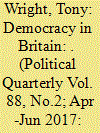

|
|
|
|
|
| Summary/Abstract |
The EU referendum has raised questions about the nature of democracy, which is not just majority rule. It is wrong to claim that direct democracy has now replaced representative democracy, as Parliament is required to answer all the questions that the referendum did not. The conduct of the referendum reflected the worst aspects of Britain's political culture of sterile adversarialism. Both left and right have shared assumptions about governing that have made it difficult to develop a culture of democratic citizenship. The political system still reflects its pre-democratic origins (as in the survival of a House of Lords and the obsession with titles) and the role of money in politics represents a form of corruption. Institutional reforms depend for their success on the nurturing of a democratic culture, which is a task for many hands.
|
|
|
|
|
|
|
|
|
|
|
|
|
|
|
|
| 2 |
ID:
092394
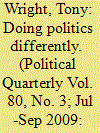

|
|
|
|
|
| Publication |
2009.
|
| Summary/Abstract |
A discussion of how politics is done in Britain, and how it could be done differently. It explores the relationship between culture and structure in politics, and between strong government and effective accountability. The argument is that the concentration on structures can lead to a neglect of the importance of political culture. It suggests that there are three democratic levels, and that Britain does better on one than on the others; and identifies a range of democratic issues to be tackled. It concludes by suggesting that even without major instrumental changes there are cultural changes that would make a difference to how politics is done in Britain.
|
|
|
|
|
|
|
|
|
|
|
|
|
|
|
|
| 3 |
ID:
046570
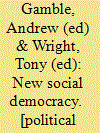

|
|
|
|
|
| Publication |
Oxford, Blackwell Publishers, 1999.
|
| Description |
viii, 185p.
|
| Standard Number |
0631217657
|
|
|
|
|
|
|
|
|
|
|
|
Copies: C:1/I:0,R:0,Q:0
Circulation
| Accession# | Call# | Current Location | Status | Policy | Location |
| 045495 | 335.5/GAM 045495 | Main | On Shelf | General | |
|
|
|
|
| 4 |
ID:
104801
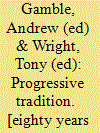

|
|
|
|
|
| Publication |
Susex, Wiley-Blackwell, 2011.
|
| Description |
323p.
|
| Standard Number |
9781444349931
|
|
|
|
|
|
|
|
|
|
|
|
Copies: C:1/I:0,R:0,Q:0
Circulation
| Accession# | Call# | Current Location | Status | Policy | Location |
| 056055 | 321.8/GAM 056055 | Main | On Shelf | General | |
|
|
|
|
| 5 |
ID:
138887
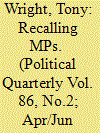

|
|
|
|
|
| Summary/Abstract |
The legislation on recall of MPs, introduced as a response to the parliamentary expenses scandal, was presented as filling an accountability gap. The nature of this alleged gap is examined, and it is argued that the accountability of Members of Parliament is more complicated than the recall proposal suggests. This includes issues about the regulation of parliamentary standards. Finally, the recall proposal is located within the context of discussion about the condition of representative democracy.
|
|
|
|
|
|
|
|
|
|
|
|
|
|
|
|
| 6 |
ID:
161663


|
|
|
|
|
| Summary/Abstract |
Tony King combined scholarship with a real‐world grasp that few could match. This was evident both in his public activities and in his published work. His studies of legislatures and of career politicians changed the way in which issues were viewed and he was skilled at identifying emerging trends before anyone else. He analysed the failings of government, but always as a practical improver. He was a natural communicator in the Bagehot tradition, as evidenced in his writings on the constitution, and he wanted a less adversarial political culture. He showed political scientists that it was possible to combine good scholarship with an ability to communicate.
|
|
|
|
|
|
|
|
|
|
|
|
|
|
|
|
| 7 |
ID:
058467
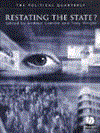

|
|
|
|
|
| Publication |
Massachusetts, Blackwell Publishing, 2004.
|
| Description |
vi, 159p.
|
| Standard Number |
1405124547
|
|
|
|
|
|
|
|
|
|
|
|
Copies: C:1/I:0,R:0,Q:0
Circulation
| Accession# | Call# | Current Location | Status | Policy | Location |
| 049068 | 320.1/RES 049068 | Main | On Shelf | General | |
|
|
|
|
| 8 |
ID:
099076


|
|
|
|
|
| Publication |
2010.
|
| Summary/Abstract |
After the expenses scandal, it is time to ask what Members of Parliament are for. The traditional formal arguments are inadequate as they fail to engage with what MPs actually do. A typology is useful in illuminating the different ways in which MPs see their role: as Lickspittles, Loyalists, Localists, Legislators, Loners and Loose Cannons. Current trends in the performance of these roles can be identified, raising questions about the nature of politics and the vitality of Parliament.
|
|
|
|
|
|
|
|
|
|
|
|
|
|
|
|
| 9 |
ID:
126999
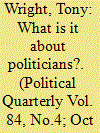

|
|
|
|
|
| Publication |
2013.
|
| Summary/Abstract |
Why do people dislike politicians and could anything be done about it? Drawing upon survey evidence, it is argued that the twin charge against politicians is that they are engaged in a kind of game and that they are a political class out of touch with real life. These charges are examined and found to have at least some merit. Remedies would involve a change in political behaviour; and measures to widen political recruitment. The consequences of not making such changes will be a further erosion of political trust. Constitutional change is less important in tackling dislike of politicians than alterations in political behaviour.
|
|
|
|
|
|
|
|
|
|
|
|
|
|
|
|